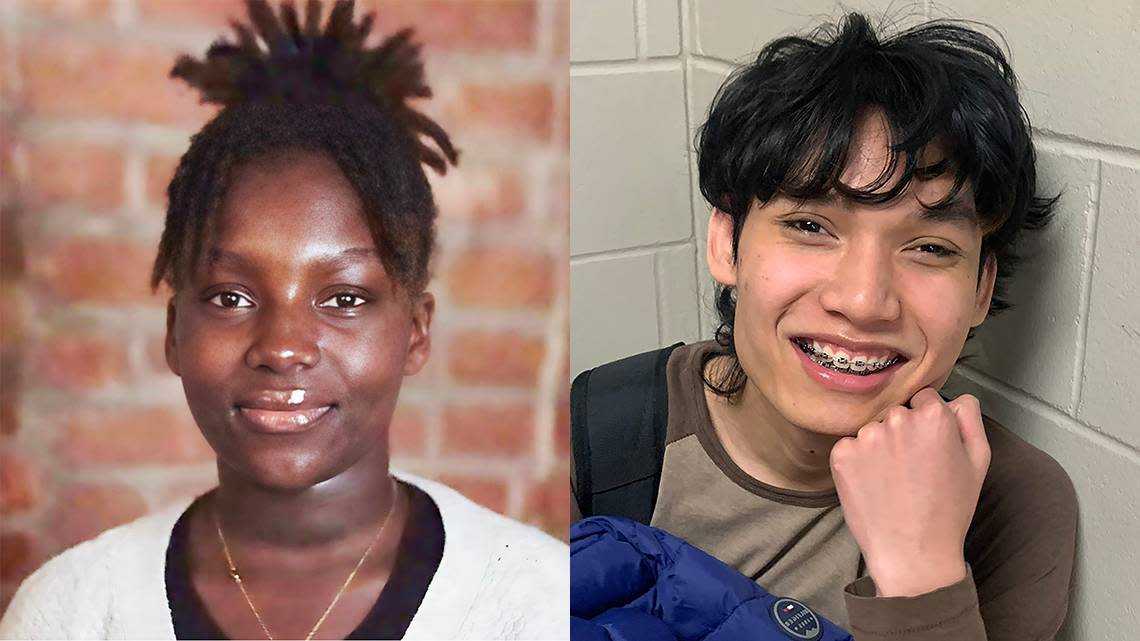Pay up, Kansas City: Helping fund college is an alternative to an uneducated populace | Opinion

Kansas City students Sadia Arome and Rainy Shwe are going into their senior year knowing they will receive $50,000 in scholarships to help them pay for college.
Sadia, of North Kansas City High School, and Rainy, who goes to Turner High School, said the windfall makes the idea of success in college seem more attainable.
I can’t say that having money will make young people want to go to college, but it sure can’t hurt.
OK, let’s think about this for a moment. If having money = education, what about the thousands of students who can’t afford to pay? And if they take out a bunch of loans, you know what can happen.
Many of you didn’t agree with President Joe Biden’s student plan for helping students caught up in loan debt. Neither did Kansas Attorney General Kris Kobach, whose recent lawsuit to stop Biden was quashed.
And opinions are nearly half-and-half on getting government help. A survey of 1,500 people found that just over half of Americans think the government should help students pay for school — not an overwhelming figure.
But 9 in 10 American parents want their children to go to college, according to a 2023 survey of 1,200 parents with children under 18. Despite concerns about cost and whether a college degree is worth it, 91% of parents surveyed still want college for their kids.
So, we want them to go, but only half of us want government help. What’s the alternative?
Here’s my thought: We’re probably going to pay somehow, so why not freely give our dollars to charitable organizations helping students with scholarships and grants?
This was on my mind when I attended A Gathering of Pearls’ scholarship event here in Kansas City a few weeks ago, and saw more than 20 smiling young men and women walk up to the stage to receive $500, $1,000, and more in funding. I saw future college grads more assured in their financial ability to pay for college.
Sponsored by and held at Harvest Church International Outreach in Kansas City, this funding comes from donors and the nonprofit Gathering of Pearls Foundation. Its vision is to have a “community where students have the financial resources for K-12 and postsecondary education.”
Next Saturday, Great Jobs KC holds its own scholarships awards day on steroids, where a total of $48 million will be given to 1,210 Kansas City high school students.
Private donors’ money opens doors
Great Jobs KC has a few different kinds of scholarships:
The KC Scholars Scholarship Program Match and Incentive program. It provides eligible students with a 1:1 match and incentives up to $1,400 to use toward college.
Traditional Scholarship for 11th graders. It provides for up to $50,000 paid directly to the student’s college, over the course of up to six years.
Adult Learner scholarships: Students 18 and older with a high school diploma or equivalent who have not earned a bachelors degree can receive up to $50,000 paid directly to their college over the course of up to six years.
Great Jobs KC does not receive any money from government entities, but rather gets its funding from donations by individuals, foundations and corporations. The Kauffman Foundation is one of its biggest donors, supplying 25% of the 501(c)(3) nonprofit’s funding, according to a spokesman.
Sadia, 16, and Rainy, 17 are receiving traditional scholarships from Great Jobs KC:
Sadia wants to pursue a degree in psychology because of the lack of mental health support in the Black and African American communities in Kansas City.
Rainy Shwe had trouble with cavities in his youth and that has inspired him to pursue a degree in dentistry.
Both are students with international ancestries. Sadia is American with parents are from Sudan. Rainy is Thai and immigrated to this country as an 11-month-old baby. For both students, immigrant parents reinforced education.
“My dad, like, barely made it to second grade and my mom made it to eighth grade,” Rainy said. “They really want me to know the importance of education and how far education can lead me.”
Sadia heard the same story. “All I heard was like, I have to go to college, I have to go to college,” but her mother, a refugee, wasn’t able to help her.
“She wasn’t able to earn her degree herself, so she pretty much knows nothing about the college process.”
Financial pressures lifted from families
Sadia said her scholarship and other awards she has gotten makes college and her choice of school possible. “Things have become way easier, and I have been less worried and less stressed about the college process.”
Rainy agreed. “I’ve always seen college as mentally attainable before the scholarship. … But, realistically, I believe that the financial strain that I could have been in has been eased by the scholarship, and I think that there’s been a weight lifted off of my and my family’s shoulders from the financial pressures.”
Seeing what the financial awards will do for them, both students plan to become donors when they graduate and get into the workforce.
“I would love to fund community scholarships in my career, and I think it would be a great way to give back to the community for allowing this opportunity presented to me,” Rainy said.
Sadia said this experience has led her to want to create a nonprofit organization.
Her nonprofit “will offer free mental health resources and services for people, who are in the Black community or people of color. It also takes the stress off of the Black community because I know that, when money is an issue, it also can be an issue when it comes to getting help for your mental health.
“That’s one of the barriers that stops Black people from getting the help they need.”
That’s two students who plan to give back. What about the rest of us?


